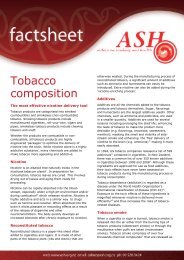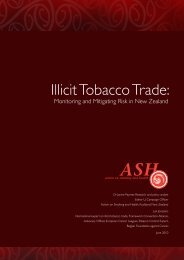Smoking and Nurses in NEW ZEALAND - ASH
Smoking and Nurses in NEW ZEALAND - ASH
Smoking and Nurses in NEW ZEALAND - ASH
You also want an ePaper? Increase the reach of your titles
YUMPU automatically turns print PDFs into web optimized ePapers that Google loves.
Foreword<strong>Nurses</strong> make an essential contribution to the health of the New Zeal<strong>and</strong> public. We are well-respected <strong>and</strong>trusted health professionals. New Zeal<strong>and</strong>’s greatest preventable public health problem is death <strong>and</strong> diseasecaused by smok<strong>in</strong>g. Many nurses promote smokefree lifestyles <strong>and</strong> help clients quit. However, the <strong>in</strong>clusionof this <strong>in</strong> all nurses’ skill sets <strong>and</strong> practice presents a challenge.<strong>Nurses</strong> have the largest reach of any group of health professionals. We work <strong>in</strong> public health <strong>and</strong> primary,secondary <strong>and</strong> tertiary sett<strong>in</strong>gs. We work with healthy families <strong>and</strong> <strong>in</strong>dividuals from every sector of society,as well as with those who are unwell. We support <strong>and</strong> work alongside other nurses <strong>and</strong> health professionals.Evidence-based <strong>in</strong>terventions, health promotion, client education <strong>and</strong> professional development are vitalelements of nurs<strong>in</strong>g. The evidence base for nurse delivery of smok<strong>in</strong>g cessation treatments is sound. Despitethis, it seems that the potential of nurses to deliver effective smokefree <strong>in</strong>terventions has not been realised.We recognise <strong>in</strong> the health sector that action encourag<strong>in</strong>g nurses to promote a smokefree approach <strong>in</strong> theirwork requires underst<strong>and</strong><strong>in</strong>g of their needs <strong>and</strong> barriers to practice. This report helps to beg<strong>in</strong> address<strong>in</strong>g thatknowledge gap. It presents a positive picture of an enthusiastic committed workforce eager to support clients<strong>and</strong> for more education <strong>and</strong> time to deliver smok<strong>in</strong>g cessation <strong>in</strong>terventions. However, few nurses reportedreceiv<strong>in</strong>g education about smok<strong>in</strong>g cessation <strong>in</strong>terventions <strong>in</strong> their <strong>in</strong>itial or post-graduate study. This is ofconcern because providers of nurse education have a major impact on the attitudes <strong>and</strong> expectations ofnurses <strong>and</strong> their practice.The further challenge for our profession is to support nurses who smoke <strong>in</strong> their efforts to quit, <strong>and</strong> to buildon the enthusiasm of the nurses <strong>in</strong> this national study for more education <strong>and</strong> for <strong>in</strong>clud<strong>in</strong>g smokefree work <strong>in</strong>their practice. This will resonate with the work of others <strong>in</strong> the health care sector, <strong>and</strong> should result <strong>in</strong> positivepopulation health outcomes.Mark JonesChief Advisor Nurs<strong>in</strong>gSector Capability & Innovation DirectorateM<strong>in</strong>istry of HealthNew Zeal<strong>and</strong>





